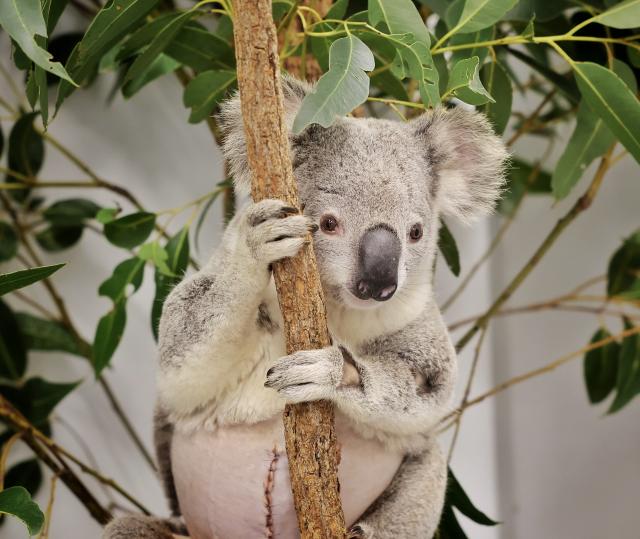Recorded as the busiest season of the year, Trauma Season arrived early at the Australia Zoo Wildlife Hospital as the veterinary team is treating 600 patients each month including Bryven, a koala who was tragically injured after being attacked by two domestic pets.
Trauma Season runs from September to February each year when temperatures rise and wildlife is on the move looking for food, new areas to call home or a friend for breeding season. It is during this time when patient admissions triple, with animals regularly being admitted from car accidents and domestic pet attacks.
Bryven came into conflict with two domestic dogs when he was rushed to the Australia Zoo Wildlife Hospital for emergency treatment. With severe trauma sustained to his abdomen, Bryven required lifesaving surgery to help treat his injuries.
Dr. Ludo Valenza, Supervisor and Veterinarian at the Australia Zoo Wildlife Hospital is urging the public to be cautious this Trauma Season, as there has been a concerning increase in the number of wildlife patients being admitted to the hospital.
“Bryven is only three years old and suffered extensive abdominal trauma from his ordeal. I performed abdominal surgery to repair multiple areas of his intestinal tract and abdomen that had been injured during the attack” said Dr. Ludo Valenza.
“The severity of the situation was demonstrated to us when we recently treated nine koalas in less than 24 hours here at the Wildlife Hospital. Koalas are now listed as an endangered species, and due to habitat loss, these animals are coming into contact with humans more than they would if they had plenty of bushland to live in. As a consequence of this, their numbers in the wild are plummeting. We need to do everything we can to save our precious national icon,” Dr. Valenza said.
Terri Irwin, Founder of Wildlife Warriors said, “From our very humble beginnings in 2004, the Australia Zoo Wildlife Hospital has come a long way, treating 10,000 wild animals each year. Trauma Season continues to have a larger effect on the natural world every year, and wildlife species need our help now more than ever.”
As one of the largest and busiest purpose-built facilities in the world, the Wildlife Hospital is open 365 days a year to treat all native animals, with the Australia Zoo Rescue Unit providing significant support to rescue and transport animals in need of help.
“By slowing down when driving at dawn and dusk, you can reduce the risk of hitting wildlife that are crossing our roads. It is important to secure your pets at night to prevent them from attacking any nocturnal animals, and by planting native trees and shrubs, you can help create habitat for wildlife in need,” Dr. Valenza said.
For more information visit wildlifewarriors.org.au.








